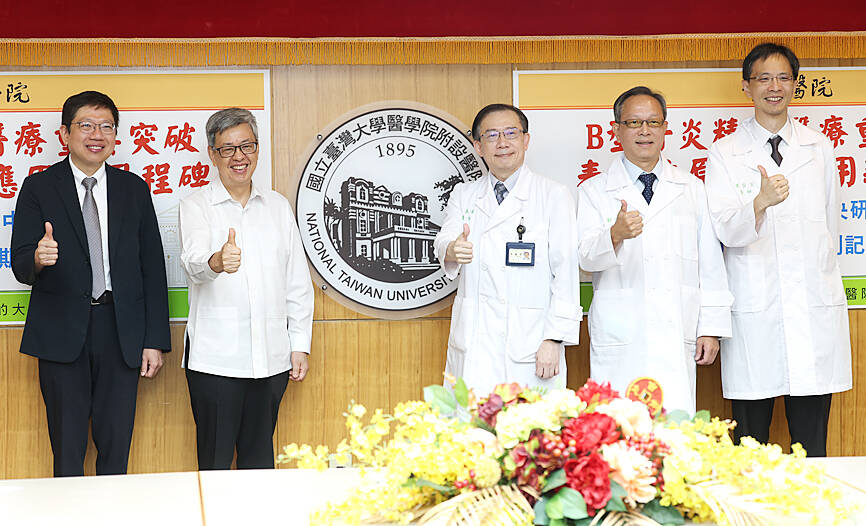National Taiwan University Hospital (NTUH) researchers have found a marker that could help identify people with chronic hepatitis B who are at high risk of developing liver cancer.
People with chronic hepatitis B who are in the “immune-tolerant phase” or the “inactive carrier phase” are usually not advised to take medication for treatment, as they are considered to be at low risk of developing liver cancer, NTUH attending internal medicine doctor Tseng Tai-chung (曾岱宗) told a news conference in Taipei yesterday.
However, the new indicator found using hepatitis B surface antigen quantification could more precisely determine whether these people need further treatment, Tseng said.

Photo: CNA
Hepatitis B infection is a major risk factor for liver cancer, which is the fourth-most common cancer in Taiwan, in terms of case numbers, and caused the second-highest number of cancer deaths last year.
Tseng’s team analyzed long-term follow-up data from cohort studies led by NTUH vice superintendent Kao Jia-horng (高嘉宏) and Academia Sinica academician and former vice president Chen Chien-jen (陳建仁), who is a distinguished professor in the Genomics Research Center, Academia Sinica.
Among the 6,139 people with chronic hepatitis B included in the studies, with follow-up periods of up to 20 or more years, 547 developed liver cancer.
In the first study, Tseng said his team found that non-cirrhotic inactive chronic hepatitis B carriers with serum hepatitis B surface antigen (HBsAg) levels below 100 international units per milliliter (IU/mL) had an annual liver cancer incidence of only 0.08 percent — below the internationally recommended 0.2 percent surveillance threshold.
As these people were near the benchmark, their risk of developing liver cancer was comparable to those without the disease, and therefore could be put on a more relaxed treatment follow-up schedule, he said.
However, for those with HBsAg above 100IU/mL, they could consider seeking new antiviral treatments for suppressing the antigen and reducing the risk of liver cancer, and then continue receiving routine follow-ups, he said.
The findings are significant for precision medicine and optimizing of liver cancer surveillance strategies, NTUH said.
Among inactive chronic hepatitis B carriers, about one-third had low HBsAg levels, so in areas where resources are limited, the other two-thirds with higher levels should be considered for more frequent examinations, Tseng said.
The second study found that those with chronic hepatitis B in the immune-tolerant phase with HBsAg greater than 10,000IU/mL were associated with delayed development of liver cancer, indicating that the antigen could be used as a biomarker to identify those who are truly in the low-risk, immune-tolerant phase and avoid unnecessary treatment, Tseng said.
The results were validated in a large Japanese cohort study, underscoring the diverse clinical value of surface antigen across different disease stages, NTUH said.
The results not only help redefine if someone is partially cured of hepatitis B virus and the clinical management of those in the immune-tolerant phase, but also provide strong evidence for future international treatment guidelines, it said.
The first study was published in the June edition of Gut, an international medical journal on gastroenterology and hepatology, while the second study was published in March in the medical journal Hepatology.

The manufacture of the remaining 28 M1A2T Abrams tanks Taiwan purchased from the US has recently been completed, and they are expected to be delivered within the next one to two months, a source said yesterday. The Ministry of National Defense is arranging cargo ships to transport the tanks to Taiwan as soon as possible, said the source, who is familiar with the matter. The estimated arrival time ranges from late this month to early next month, the source said. The 28 Abrams tanks make up the third and final batch of a total of 108 tanks, valued at about NT$40.5 billion

Two Taiwanese prosecutors were questioned by Chinese security personnel at their hotel during a trip to China’s Henan Province this month, the Mainland Affairs Council (MAC) said yesterday. The officers had personal information on the prosecutors, including “when they were assigned to their posts, their work locations and job titles,” MAC Deputy Minister and spokesman Liang Wen-chieh (梁文傑) said. On top of asking about their agencies and positions, the officers also questioned the prosecutors about the Cross-Strait Joint Crime-Fighting and Judicial Mutual Assistance Agreement, a pact that serves as the framework for Taiwan-China cooperation on combating crime and providing judicial assistance, Liang

A group from the Taiwanese Designers in Australia association yesterday represented Taiwan at the Midsumma Pride March in Melbourne. The march, held in the St. Kilda suburb, is the city’s largest LGBTQIA+ parade and the flagship event of the annual Midsumma Festival. It attracted more than 45,000 spectators who supported the 400 groups and 10,000 marchers that participated this year, the association said. Taiwanese Designers said they organized a team to march for Taiwan this year, joining politicians, government agencies, professionals and community organizations in showing support for LGBTQIA+ people and diverse communities. As the first country in Asia to legalize same-sex

MOTIVES QUESTIONED The PLA considers Xi’s policies toward Taiwan to be driven by personal considerations rather than military assessment, the Epoch Times reports Chinese President Xi Jinping’s (習近平) latest purge of the Chinese People’s Liberation Army (PLA) leadership might have been prompted by the military’s opposition to plans of invading Taiwan, the Epoch Times said. The Chinese military opposes waging war against Taiwan by a large consensus, putting it at odds with Xi’s vision, the Falun Gong-affiliated daily said in a report on Thursday, citing anonymous sources with insight into the PLA’s inner workings. The opposition is not the opinion of a few generals, but a widely shared view among the PLA cadre, the Epoch Times cited them as saying. “Chinese forces know full well that